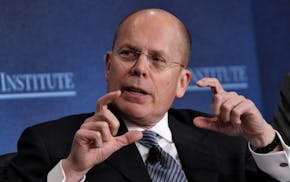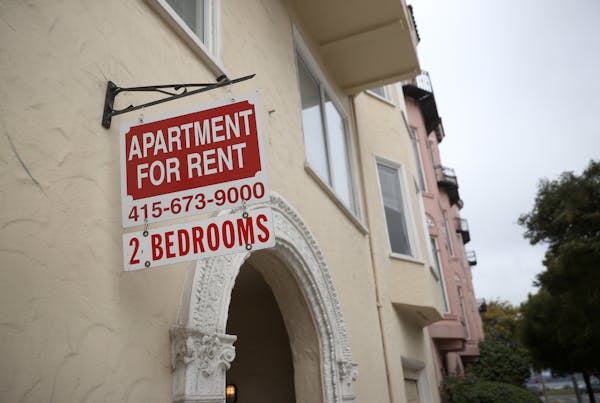Are you wracked by analysis paralysis over whether to buy a house or rent an apartment?
You're not alone these days. Rising mortgage rates have completely changed the equation for prospective first-time buyers.
Consider these confounding market dynamics: Mortgage rates are nearly double what they were a year ago, but they're still below historical averages. Home prices are still on the rise, but those increases are slowing quickly. Buyers have more choices than last year, but houses are still selling in only about a month.
What's a would-be buyer to do?
From a purely financial perspective, it's definitely less expensive to rent in the metro area because rental prices in the Twin Cities are much lower than similar-sized markets and are significantly less expensive than a typical house payment.
Jeff Tucker, chief economist at Zillow, said that during August the typical monthly rent for houses and apartments in the Twin Cities metro was $1,683 — the 20th lowest among the 50 largest metros — compared with a $2,181 mortgage payment for a typical Twin Cities home. That includes principal, interest and private mortgage insurance (PMI), assuming a 5% down payment.
That $498 gap is greater than any of the 19 markets with less expensive rents.
"That doesn't necessarily mean renting is the better financial choice in the long run," said Tucker. "But it does mean recent market movements have tilted the math more in favor of renting, and that renting makes more financial sense in the Twin Cities than in other peer markets."
Tucker said that with higher mortgage rates eroding buying power, the market is rebalancing — meaning price growth is slowing to a more sustainable level. That means buyers shouldn't expect the torrid price gains seen earlier in the pandemic.
"At the same time," he said, "buyers waiting on the sidelines for significant purchase cost savings down the road may be disappointed as well, if interest rates rise further or if rising rents erode their current cost savings."
The economists at Realtor.com recently completed a similar analysis, which showed that among the 50 largest metros in the nation, rents in the Twin Cities grew at the slowest pace during June, rising 3.3% year-over-year increase to a median of $1,597. The average in the 50 largest U.S. metropolitan areas? $1,876.
That study was done when the average 30-year fixed-rate mortgage was 5.52%; Today, it's nearly a full percentage point higher.
At the same time, the list price for the median starter home in the Twin Cities this summer was $279,408, 13.8% higher than the year before. The monthly cost of that starter home was $2,249, 34.2% higher than the year before, making the monthly cost of buying a starter home $652 more expensive (40.9%) than renting one.
Higher mortgage rates, stable rents and rising home prices have made the monthly cost of renting a home lower than buying a starter home in 38 of the 50 largest U.S. metros. That's a sharp increase from January when the same analysis showed renting made more sense than buying in just 24 markets.
Experts say that while the economics of buying are important, there are other factors that should considered:
- How long do you plan to live in that home? Selling a home is expensive, so at a time when home prices are rising more slowly, you might not have enough equity to cover your costs if you only plan to live in the house a few years.
- Are rents in your area likely to increase?
- There are also lifestyle differences. Do you want maintenance-free living or do you like yard work or need a big yard for some reason?
Jeff Wills, a homeownership counselor who routinely helps people decide whether it's time to buy, said affordability is at the front of every conversation he has with people who are weighing their options.
"It's tough to paint with a wide brush as many consumers' individual circumstances are different," he said.
Wills, a program manager for the Minneapolis-based nonprofit, PRG, said would-be buyers who meet with PRG advisers are asked to start the process by building a budget. The non-profit also connects want-to-be buyers with resources that can help provide down payment/closing-cost assistance.
Wills offers the following considerations for people who are weighing their options:
- Get advice on whether or not it makes sense to buy from someone who doesn't stand to benefit financially from the outcome of that decision. He suggests discussing the situation with a HUD-certified housing counselor rather than a loan officer or real estate agent.
- Ultimately, the decision is largely dependent on the buyer's individual circumstances. Not everyone is in a financial position to purchase a home but buying a property that you can afford with a fixed-rate mortgage will give buyers more long-term control over their housing costs.
Wills said that despite higher interest rates, homeownership is still the primary way that the vast majority of Americans build wealth, so he encourages people to buy if they're able.
"Given our dismal BIPOC homeownership disparity, it is no wonder that families of color in the Twin Cities have just a fraction of the wealth that white families enjoy," he wrote in an email. "The best time (in my opinion) to purchase a home is when you can afford it."
Help for the decision-weary
Rent vs. buy calculators can be a big help when it comes to understanding the financial implications. One of our favorite calculators was created by the New York Times. There are many others, including a helpful "Should I buy a home or keep renting" worksheet from Fidelity Investments. That site includes a list of five questions you need to ask before buying, but also a link to a rent vs. buy calculator.
If you want to talk with someone about your situation there are many options in the Twin Cities including PRG Inc, a local nonprofit that provides HUD-approved counselors and home buyer classes. You can reach them at 612-721-7556. The Minnesota Homeownership Center is a one-stop shop for information, resources, classes and counseling across the state. Its phone number is 651-659-9336.

UnitedHealth shareholders give tepid support to $60M in stock-based pay for new CEO
Target recalls more employee groups to downtown Minneapolis headquarters

Ronzoni pasta-maker coming to Lakeville in $880 million Post acquisition

$200M acquisition by Minneapolis company will help it aid other firms make deals


